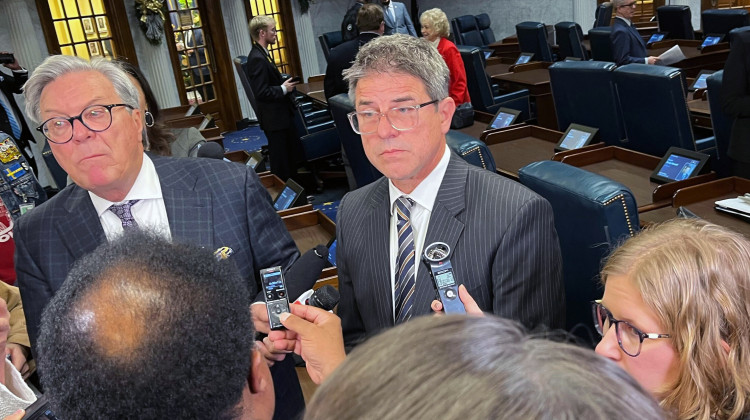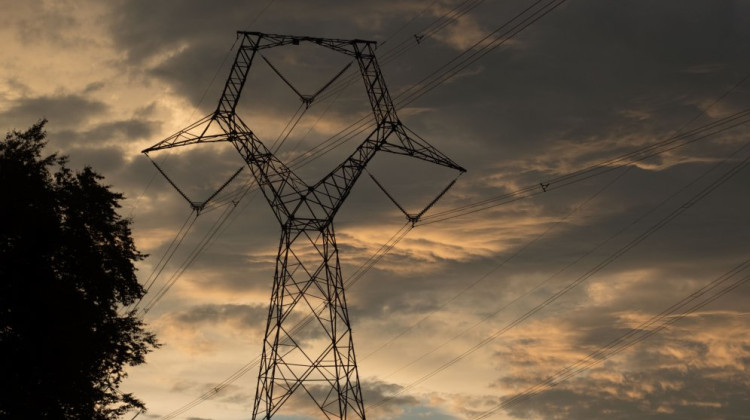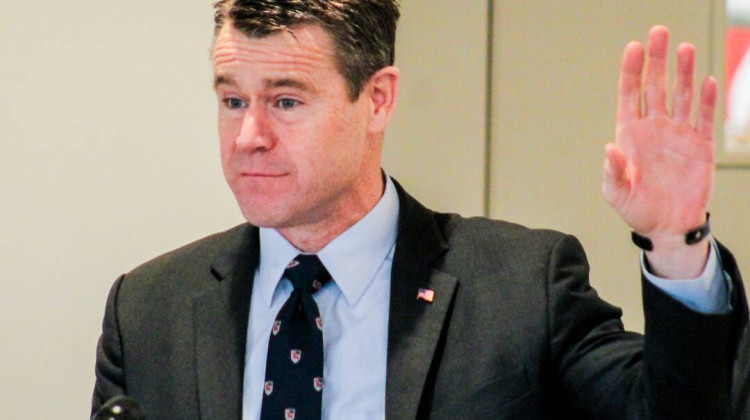
Senate President Pro Tem Rodric Bray (center) takes questions from reporters after lawmakers voted not to return until January 5, officially bucking calls to redistrict ahead of 2026.
Benjamin Thorp / WFYIIndiana state Senators voted to return in January for the new legislative session, bucking calls from President Donald Trump and Gov. Mike Braun to convene in December to craft new congressional maps that favor Republicans.
The decision drew a quick rebuke from Braun, who promised to pursue all options in compelling senators to show up and vote.
"I will support President Trump's efforts to recruit, endorse, and finance primary challengers for Indiana's senators who refuse to support fair maps," Braun said in a statement.
Lawmakers gathered Tuesday for Organization Day, the ceremonial start to the legislative session. Leaders typically use the day to announce their caucus's agenda, but redistricting remained the focus for Republicans and Democrats.
The Trump administration has for months pressured state lawmakers to change congressional maps in hopes of expanding Republicans' majority in the U.S. House during the midterm elections.
Republicans currently hold seven of Indiana's nine U.S. House seats. Democrats represent the 1st District in northwest Indiana — held by U.S. Rep. Frank Mrvan — and the 7th District in Marion County, anchored by Indianapolis — held by U.S. Rep. André Carson.
But senators held firm on Tuesday, determining not to come in until January.
Senate President Pro Tem Rodric Bray (R-Martinsville) said while he wants Republicans to keep control of Congress, he doesn't feel redistricting is the right way to do it.
"We're trying to do the best thing for the state of Indiana as well as for the United States of America," Bray said.
Bray noted that Indiana's 1st Congressional District was already trending more conservative, and he believes that with a good candidate, Republicans might be able to flip that district without needing to withdraw it.
"A number of our caucus members, myself included, don't see this as a binary choice between the seven-two ratio they have right now, and redistricting getting to an automatic nine," Bray said.
Republican Senator Mike Young (R-Indianapolis) favors redistricting. He said he would be upset if Democrats are able to take back the U.S. House.
"I don't want to cry on Wednesday morning following that election, knowing we could have done something and we didn't," Young said. "Knowing that everything we did so far that was good has been stopped. Knowing that our nation, at least from my perspective, is imperiled."
Young told lawmakers if they really wanted fair maps they should give two more seats to Democrats. Indiana's current congressional map was drawn in 2021.
"Why are we so concerned about being fair on redistricting? Because we're not fair the other way," Young said. "You can't have it both ways."
In the House, lawmakers also voted not to return until January, but Speaker Todd Huston told members to keep their schedules open.
"Ultimately, I hope Congress takes action to prohibit mid-decade redistrict — redistricting to ensure every state is operating under the same rules," Huston said. "But until that happens, Indiana cannot bury its head in the sand."
The fight over mid-decade redistricting has engulfed the Indiana GOP. Trump and Braun have both criticized lawmakers. One Indiana lawmaker, Sen. Greg Goode (R-Terre Haute), was swatted in his Vigo County home hours after Trump criticized him on Truth Social.
On Tuesday Goode said he remained undecided until a map and legislation are introduced in the state Senate.
Pressure to redistrict from Washington D.C. has irked some Indiana Republicans, like Sen. Jean Leising (R-Oldenburg). Others, like Sen. Liz Brown (R-Fort Wayne), are still backing it.
Contact Health Reporter Benjamin Thorp at bthorp@wfyi.org
Contact WFYI Data Journalist Zak Cassel at zcassel@wfyi.org
 DONATE
DONATE








 Support WFYI. We can't do it without you.
Support WFYI. We can't do it without you.